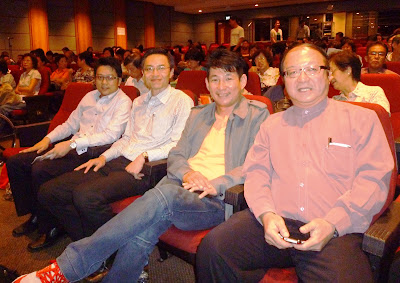The writer of this article, Raymond Anthony, seen here with his wife
at the opening of Silver Ribbon on 4 Feb 2006
I just could not believe my eyes when I read the report in The New Paper about DJ Glenn Ong’s degrading comments about the mentally ill (‘Put these mad dogs to sleep’, TNP, Sept 20.) Ong’s offensive and insulting comments have hurt many people, including caregivers like myself who have the courage and conviction to care for their stricken ones despite the journey being an arduous and lonely one. Lonely and arduous, partly because insulting comments about the mentally ill continue to make it practically impossible for society to accept that people with mental illness are also human and need love, understanding and support.
People with mental illness have been unfairly labelled psycho, mad, freak, siow and what have you. In making reference to psychiatric patients, DJ Ong humiliates the mentally ill by going on air and suggesting that, “If you have to put these mad dogs to sleep, then you should.” When a conversation only focusses on negative comments, you will invite more and more humiliating remarks.
I am perplexed that such hurtful and offensive comments against the mentally ill can be allowed to be aired on a national broadcasting station during prime time when listenership is high. These remarks Ong mentioned on air could send the wrong signal to the public – that the mentally ill are all trouble makers. This is far from true.
At a time when the Government wants to build a gracious, cohesive and inclusive society where every citizen matters, such behaviour on the part of this DJ is totally unacceptable.
Let us not forget that social stigma can cause low-esteem for the sufferers and may become a barrier to everyday opportunities and activities, including jobs and education.
Broadcasters have a moral duty to inform, educate and entertain its listeners and viewers. In highlighting two cases of mental patients causing disruptions which DJ Ong encountered, what was Ong trying to put across?
Mental illness is clearly a misunderstood illness in many parts of the world, Singapore included. When people don’t understand mental illness, they become biased against the sufferers. This is why promoting education on mental illness is relevant to everyone. But attitudes must change, and this is where the media plays an important role.
The media must be held accountable because if it portrays people with mental illness inaccurately, such stereotyping makes it harder to change mindsets. In America, psychiatric patients are major contributors to American life – from the arts to the sciences, from medicine to entertainment to professional sports.
When educating the public, the presenter needs to present different perspectives on any issue. In the case of psychiatric patients, there are many who, with treatment, can go on to lead a perfectly normal life. This has not been highlighted. Why? Why only paint one side of the story?
Social stigma can cause low-esteem for mentally ill people and may become a barrier to everyday opportunities and activities, including jobs and education.
I have gone on national TV, radio and in the press to speak about my wife’s battle with schizophrenia and how I have helped her to move on in life; using the literary skills that she possesses (my wife is an author of 6 books). I tap on her strengths; not on her weakness. I’m proud of my wife and I would like her to be a role model for others in her condition to emulate, so that those who are living in the shadow of life will one day get to see “light at the end of the dark tunnel.”
I have spoken candidly about my wife’s illness, not because I want sympathy, but because I want acceptance, just like all in my wife’s condition long for. I have put in tremendous effort coupled with so much emotional pain and suffering to help my wife in her “recovery” and I certainly do not want such negative and insensitive remarks on the part of DJ Glenn Ong to demolish what I have built over the years.
World Mental Health Day is just around the corner – 10 October 2011, so please spare a thought for psychiatric patients and their caregivers who are one of the most neglected in our society.
I look forward to DJ Ong’s apology.
Sincerely,
Raymond Anthony Fernando
Caregiver
For responses and comments to his letter, log on to:
http://theonlinecitizen.com/2011/09/dj-glenn-ongs-deeply-hurtful-comments/
















